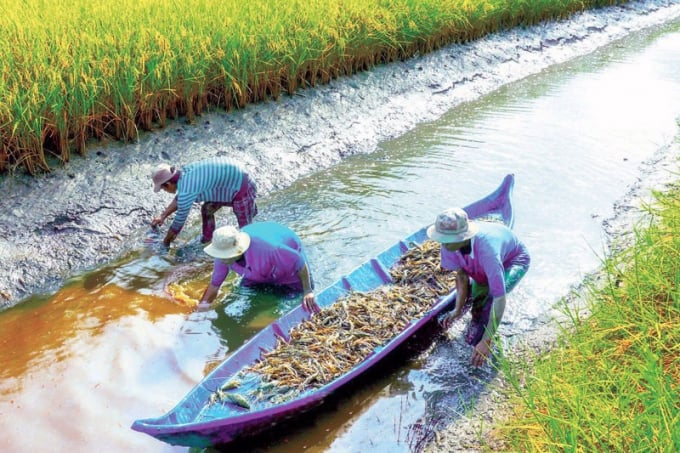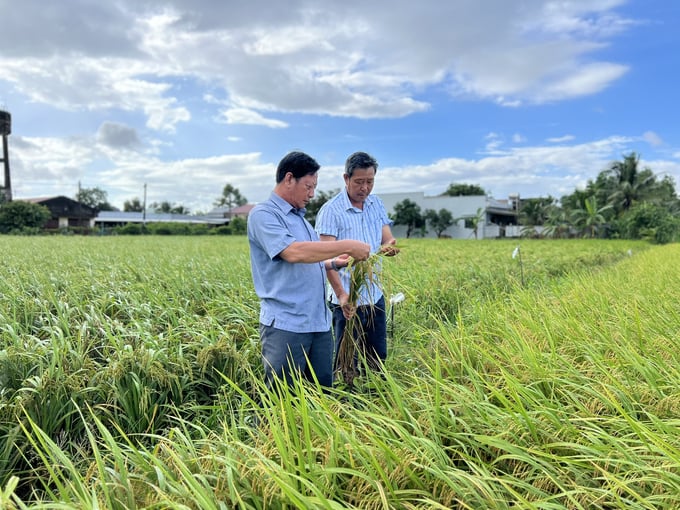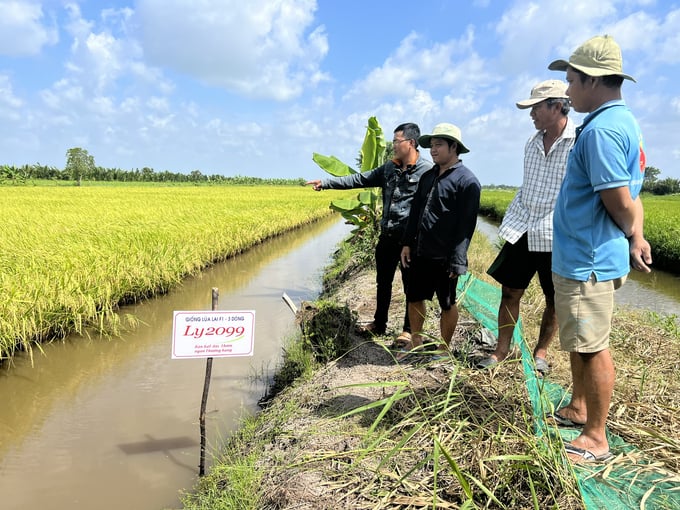November 23, 2025 | 20:16 GMT +7
November 23, 2025 | 20:16 GMT +7
Hotline: 0913.378.918
November 23, 2025 | 20:16 GMT +7
Hotline: 0913.378.918
Promoting the development of organic agriculture is Bac Lieu’s primary orientation at present as it is considered one of the key tasks. The local agriculture sector is focusing on guiding farmers to produce in a safe direction, thereby limiting the use of antibiotics, chemicals, growth stimulants, inorganic fertilizers, and pesticides of toxic origin. In particular, the province is implementing two groups of organic production models.

Bac Lieu aims to make the most of the "fragrant rice - clean shrimp" value chain. Photo: TL.
Regarding aquaculture, local authorities encourage farmers to use probiotics in order to better manage the environment, use disease-free breeds at appropriate densities and stock a variety of fish species in consideration of water treatment matters, and develop ecological aquaculture models towards organic production and sustainability.
The model “improved extensive aquaculture in coastal mangrove forests” is a mentionable example. It has a total production area of 75,000 ha, in which the shrimp - rice farming area occupies 40,000 ha. Farming models such as this one have affirmed sustainability and efficiency which is reflected in product quality. The shrimp - rice model is highly appreciated by domestic and foreign scientists as it shows profits 15 - 30% higher than rice monoculture models.
As for the field of cultivation, Bac Lieu has implemented the model "building community organizations through smart rice farming cooperatives and cooperative groups in the direction of organic production, applying mechanization, adapting to climate change, and establishing linkage for product consumption" on an area of 300 ha. The model uses certified rice varieties, promotes the use of organic fertilizers along with biological pesticides. Profits from the model are VND 20 - 25 million/ha higher than the conventional farming model.
Hoa Binh in particular has applied a rice production model with increased organic fertilizers and reduced inorganic fertilizers for specialized areas producing rice 2-3 crops per year. The model has helped farmers reduce the amount of seeds sown as well as the amount of inorganic fertilizer used by 10 - 15% while supplementing organic fertilizers and prioritizing pesticides of biological origin. This results in quality and safe products which can be sold at a high price. Farmers participating in the model feel satisfied because the profit increased by over VND 19 million/ha.

Bac Lieu's organic rice production models have helped farmers reduce costs, increase profits, and improve the ecological environment. Photo: Trong Linh.
Farmers are also encouraged to use certified rice varieties while applying "3 decreases, 3 increases", "1 must, 5 decreases", and integrated pest management (IPM) program, thereby improving product quality, protecting the environment and ensuring food safety for consumers.
Luu Hoang Ly, Director of Bac Lieu Department of Agriculture and Rural Development, said that in order to successfully achieve the goals of the organic agriculture development scheme on the basis of effectively promoting local potentials and advantages, the province’s agricultural sector will further invest in renovating and upgrading transport, irrigation, and electricity infrastructures for production sub-regions.
Accordingly, priority will be given to small and medium dike areas. Irrigation systems and electric pumping stations will receive maintenance and upgrades to ensure flexible and timely water supply, drainage and storage of salt and fresh water in the direction of biosafety and high technology application.
The local authorities will continue to support brand building, gradually develop the shrimp-rice product brand and create a breakthrough for Bac Lieu's BL9 rice variety, direct the replication of high-quality rice varieties that are tolerant to alum, salinity, and have good pest resistance (ST24, ST25, Mot Bui Do, etc.) in localities as a way to promote organic production associated with the issuance of growing area codes and farming facility codes to perform traceability.

The shrimp - rice model in Phuoc Long district, Bac Lieu province. Photo: Trong Linh.
On the other hand, the agriculture sector of Bac Lieu province plans to accelerate the construction of an agricultural park that applies high technology to deploy smart shrimp farming, ensure biosafety and integrate digital technology. The local authorities support the establishment and consolidation of cooperatives so that they have enough capacity to organize production in a sustainable and effective manner.
Bac Lieu’s current objective is to improve the financial capacity of cooperatives and cooperative groups through credit policies in service of local agricultural and rural development according to regulations. In particular, the province focuses on promoting the development of organic agriculture and developing strategies to attract businesses.
Translated by Samuel Pham
/2025/11/22/4018-4-213342_747.jpg)
(VAN) The Mekong Delta Agricultural Experts Club has attracted 143 experts and researchers to participate in providing consultancy and contributing initiatives to the development of one million hectares of high-quality rice.

(VAN) Ca Mau’s development of OCOP products opens a path to increasing cooperatives value, helping boost income, expand markets, and affirm collective economy's role.

(VAN) Turning seemingly ordinary coconut shells into unique jewelry and artwork, Nguyen Bang Nhi spreads the value of local culture through her brand, Cocohand.

(VAN) Results from the Sustainable Durian Model Project in Dak Lak have confirmed the critical role of Yara Viet Nam in transferring advanced nutritional solutions to farmers.

(VAN) In Tuyen Quang province, livestock farmers have introduced effective models and innovative practices that significantly strengthen African Swine Fever prevention and control efforts.

(VAN) This is the study conducted by IRRI and Can Tho University on the rice straw value chain in Mekong Delta showing an economic potential of more than 6.6 trillion VND/year.

(VAN) By participating in cooperative economics, many farmers in Tay Ninh have overcome hardship, mastered clean dragon fruit cultivation techniques.